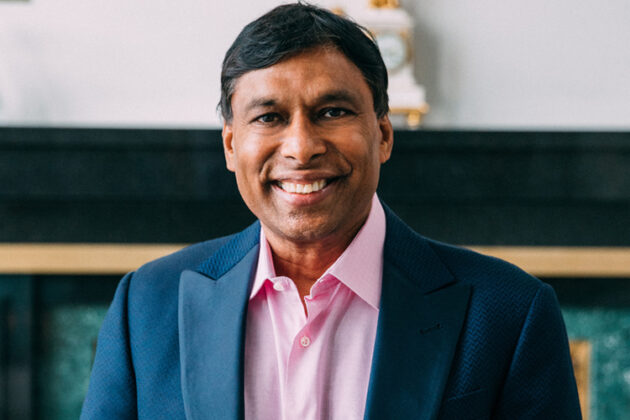Viome, a life sciences startup founded by veteran tech entrepreneur Naveen Jain, announced a collaboration with Microsoft to scale its molecular analysis platform — part of what Viome describes as a new era of AI-powered preventive health and wellness.
Viome says Microsoft’s cloud and AI infrastructure — specially tuned for its purposes in conjunction with the tech giant — will allow it to process biological data more efficiently. The idea is to expand access, reduce costs, and accelerate data processing and diagnostics.
For Jain, it’s a full-circle moment.
Before founding such companies as InfoSpace, Intelius, and Moon Express, he was a Microsoft group manager in the 1980s and ’90s, working on the business side of MSN while current Microsoft CEO Satya Nadella ran engineering for Microsoft’s online division.
“Satya will someday be known as being one of the best CEOs in human history,” Jain said, using some of his trademark exuberance to describe Viome’s work with the tech giant. “He has changed Microsoft to be a company that’s an unbelievably great partner.”
Their collaboration addresses a massive scaling challenge. Viome says it has data from more than 1 million samples (including blood, saliva, and stool) from people in 106 countries, generating what it calls an unprecedented set of more than 10 quadrillion biological data points.
Processing this data requires large memory footprints and high-speed storage, rather than the GPU-heavy computing more typical of everyday AI workloads. That difference is what drove the Microsoft collaboration, said Guru Banavar, Viome’s CTO and head of AI, who previously led the team that built the foundational AI platform for IBM’s Watson.

The underlying architecture developed by Microsoft and Viome “was put together specifically to handle this type of bioinformatics with a very large-scale catalog, with a large-scale data set that’s being transferred back and forth,” Banavar said.
Other life sciences companies on Microsoft’s Azure cloud and AI platform may also now benefit from this work, but Banavar said their early collaboration gives Viome a strategic advantage.
The Bellevue, Wash.-based company’s platform analyzes how genes and microbes in the body are actively functioning in real time, not just which ones are present in the body. Viome then uses that data to generate personalized health insights and recommendations.
Viome does this by focusing on RNA, which plays a key role in how genes are expressed and regulated, rather than DNA, which serves as the body’s more static genetic blueprint.
The long-term idea is to create what it calls “biological digital twins” — computer models that can predict how individuals will respond to specific foods and interventions.
Viome is straddling the line between consumer wellness and clinical diagnostics as it looks to address issues ranging from depression to early-stage oral cancer.
On the consumer side, it offers testing kits for saliva, blood and stool samples, with prices currently ranging from $229 to $299. Customers collect the samples at home and send them to Viome’s lab for analysis.
Results include personalized diet and nutrition insights, with options to subscribe to supplements and oral care products ranging from $79 to $199 a month. These offerings fall under the wellness category and are generally not subject to FDA regulation.
According to Jain, Viome distinguishes itself in the wellness space by conducting blinded, placebo-controlled studies to validate its recommendations, publishing in peer-reviewed journals.

The rise of AI and molecular analysis has led to a boom in competition in the personalized health sector, with companies like Thorne, ZOE, BIOHM and others offering various approaches to microbiome testing and wellness insights.
At the same time, Viome has developed diagnostic tools that analyze RNA biomarkers to detect disease — including a test for early detection of oral cancer that has received FDA breakthrough device designation. That designation is designed to speed the review of promising technologies, but it is not equivalent to full FDA clearance or approval.
Jain said he was inspired to start the company after his late father was diagnosed with pancreatic cancer. The experience led him to question why people develop chronic conditions, and whether diseases like cancer, diabetes and heart disease could be prevented by detecting earlier biological changes.
The company’s technology originated from a biodefense project at Los Alamos National Laboratory. This was an outgrowth of an approach Jain started pursuing in 2015 with his company BlueDot, aiming to commercialize scientific breakthroughs from institutions like Los Alamos and Oak Ridge National Laboratories.
Founded in 2016, Viome has raised $225 million in total funding from investors including Khosla Ventures, Bold Capital, West River Group, Marc Benioff, Ezaki Glico, and Jain himself.
Viome now employs close to 100 people and had nearly 100% year-over-year revenue growth, according to Jain, who declined to provide specific financials. Most customers, he said, not only take the tests but also subscribe to personalized nutrition products.
Read the full article here










